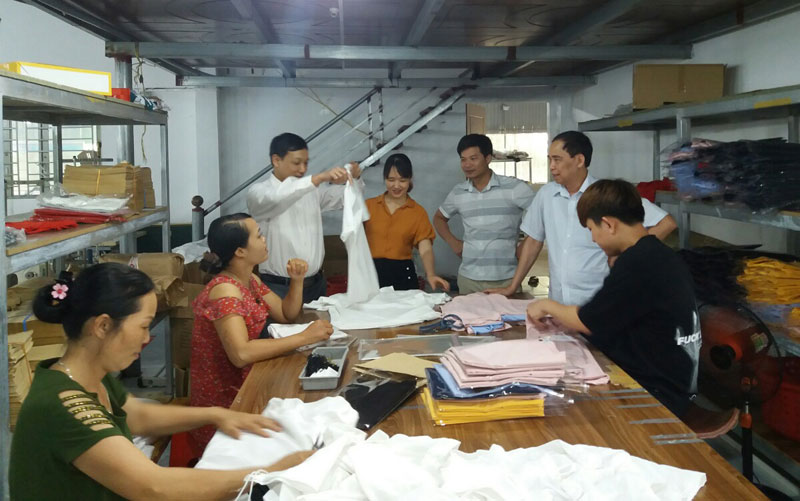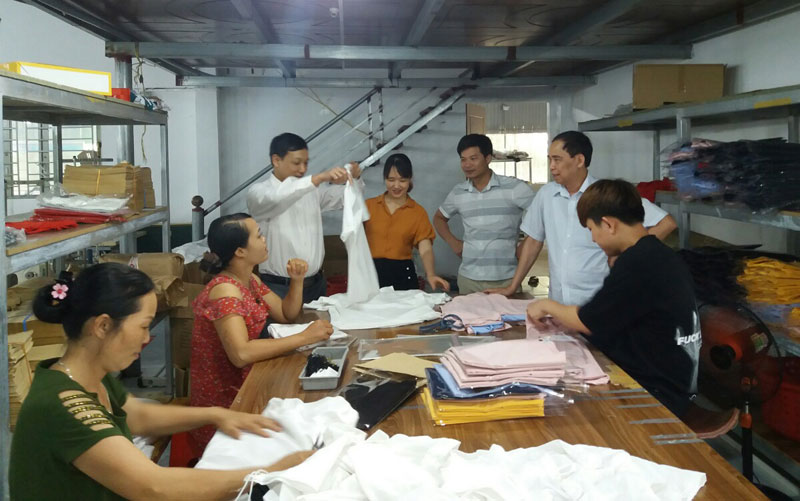
(HBO) - With utmost efforts and resolve, the provincial Department of Industry and Trade has actively coordinated with relevant sectors and district-level administrations to step up the implementation of Resolution No. 02, issued on December 28, 2015, by the provincial Party Committee, on the development of industry and handicraft industry in Hoa Binh for 2016-2020.
 Officials of the Hoa Binh provincial Department of Industry
and Trade and the Centre for Industrial Extension and Industry Development
Consultancy visit the An Phuc garment workshop in Hang Tram township, Yen Thuy
district.
Officials of the Hoa Binh provincial Department of Industry
and Trade and the Centre for Industrial Extension and Industry Development
Consultancy visit the An Phuc garment workshop in Hang Tram township, Yen Thuy
district.
In particular, they have pressed on with
improving the investment and business climate so as to create the best possible
conditions for investment in industrial parks and clusters. They have also
worked with relevant agencies and localities to speed up building
infrastructure as well as technical facilities at industrial parks and
clusters, especially roads to these places. Besides, support and manufacturing
industries have been developed to improve the quality, efficiency and
competitiveness of the products Hoa Binh has strength in.
In the first half of 2020, the province’s
industrial production value was estimated at 19.8 trillion VND (853.1 million
USD), up 1.54 percent year on year and equivalent to 46.04 percent of this
year’s plan. Some industrial and handicraft products post fair growth in output
compared to the same period last year such as cement, brooms, metal products
and medium density fiberboards. However, output declines were recorded in
apparel (down 4.95 percent), electronics (2.47 percent), power for production
activities (52.9 percent), and bricks of all types (2.96 percent). Besides, the
output of many products also failed to achieve half of their annual targets.
These figures have made the fulfillment of this
year’s targets a heavy task, including industrial production value rising 15
percent year on year to over 43 trillion VND and added industrial value growing
11.8 percent.
To tackle difficulties to promote industry and
handicraft industry, the provincial People’s Committee assigned the Department
of Industry and Trade to go on with the industry and handicraft industry
development plan for 2020. Accordingly, apart from fostering support,
processing and manufacturing industries, the department has been facilitating
the industries that serve agriculture, rural development, and farm produce
processing. It has also been encouraging businesses to form more sustainable
connectivity, especially in some major processing and manufacturing sectors
like textile-garment, leather-footwear, electronics and wood products, with
partners from the Republic of Korea, Japan and India so as to avoid
overdependence on a single or just few partners or markets.
The department has coordinated with other
agencies to improve the management of mineral mining, especially stone mining
for construction material production. It has also worked with the Hoa Binh
Power Company to build electricity supply plans so as to meet demand in
economic activities and people’s daily lives.
Recently, the Centre for Industrial Extension
and Industry Development Consultancy checked and took over some national
industrial extension projects, including the one on assisting the application
of advanced machinery to textile-garment production at the An Phuc Export
Garment JSC, based in Hang Tram township of Yen Thuy district, and another on
assisting the application of advanced machinery to agro-forestry processing at
the Lac Thuy Essential Oil JSC, based in Phu Thanh commune of Lac Thuy
district.
These projects have generated practical
benefits, useful for bolstering industrial development in rural areas, creating
stable jobs and raising income for local residents, the Department of Industry
and Trade said, noting that they have also helped businesses develop production
after COVID-19 was brought under control./.
According to data from the Hoa Binh Provincial Party Committee, the industrial production index for the first six months of 2025 is estimated to have increased by 20% compared to the same period last year. This marks the highest year-on-year growth rate for this period since 2020.
In the first six months of 2025, Hoa Binh province’s export turnover was estimated at 1.145 billion USD, marking an 18.11% increase compared to the same period in 2024. Import turnover was estimated at $ 804 million, a 17.15% increase, which helped the province maintain a positive trade balance.
The lives of the ethnic minority farmers in Tan Lac district have gradually improved thanks to the new directions in agricultural production. This is a testament to the collective strength fostered through the professional associations and groups implemented by various levels of the district’s Farmers’ Union.
With the motto the "product quality comes first,” after nearly one year of establishment and operation, Muong village’s Clean Food Agricultural and Commercial Cooperative, located in Cau Hamlet, Hung Son Commune (Kim Boi district), has launched reputable, high-quality agricultural products to the market that are well-received by consumers. The products such as Muong village’s pork sausage, salt-cured chicken, and salt-cured pork hocks have gradually carved out a place in the market and they are on the path to obtaining the OCOP certification.
In the past, the phrase "bumper harvest, rock-bottom prices" was a familiar refrain for Vietnamese farmers engaged in fragmented, small-scale agriculture. But today, a new spirit is emerging across rural areas of Hoa Binh province - one of collaboration, organisation, and collective economic models that provide a stable foundation for production.
Maintaining growing area codes and packing facility codes in accordance with regulations is a mandatory requirement for agricultural products to be eligible for export. Recently, the Department of Agriculture and Environment of Hoa Binh province has intensified technical supervision of designated farming areas and packing facilities to safeguard the "green passport" that enables its products to access international markets.



 Officials of the Hoa Binh provincial Department of Industry
and Trade and the Centre for Industrial Extension and Industry Development
Consultancy visit the An Phuc garment workshop in Hang Tram township, Yen Thuy
district.
Officials of the Hoa Binh provincial Department of Industry
and Trade and the Centre for Industrial Extension and Industry Development
Consultancy visit the An Phuc garment workshop in Hang Tram township, Yen Thuy
district.